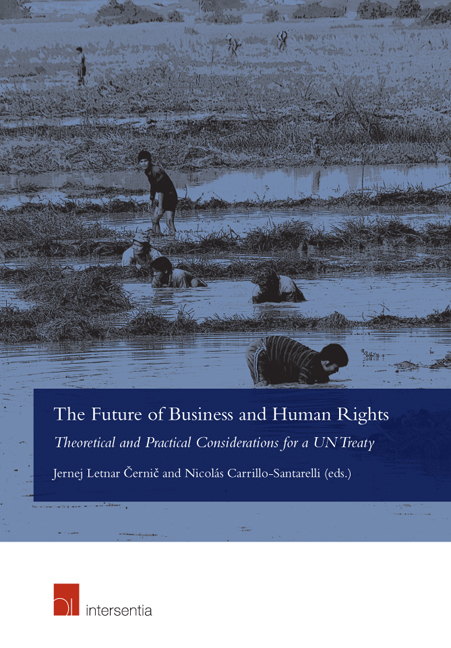Book contents
- Frontmatter
- Dedication
- Acknowledgements
- Contents
- About the Contributors
- Introduction
- Part I The Convenience and Possibility of Adopting a Treaty on Business and Human Rights
- Part II Critical Analyses Of A Treaty On Business And Human Rights
- Part III Regional Approaches
- PART IV Lessons from other Regimes of International Law
- A Convention or a Recommendation? The Experience of International Labour Legislation
- Lessons for the Treaty Process from the International Law Commission and International Environmental Law
- Conclusion
- Index
A Convention or a Recommendation? The Experience of International Labour Legislation
from PART IV - Lessons from other Regimes of International Law
Published online by Cambridge University Press: 11 October 2018
- Frontmatter
- Dedication
- Acknowledgements
- Contents
- About the Contributors
- Introduction
- Part I The Convenience and Possibility of Adopting a Treaty on Business and Human Rights
- Part II Critical Analyses Of A Treaty On Business And Human Rights
- Part III Regional Approaches
- PART IV Lessons from other Regimes of International Law
- A Convention or a Recommendation? The Experience of International Labour Legislation
- Lessons for the Treaty Process from the International Law Commission and International Environmental Law
- Conclusion
- Index
Summary
INTRODUCTION
The question whether to opt for a legally binding instrument or not, i.e. a treaty or a resolution, has always been a difficult one for decision-makers in public international law. Our current task of evaluating the decision taken by the United Nations Economic and Social Council (ECOSOC) to formulate a Treaty on Business and Human Rights is, therefore, not a new one. We can recall the development of international human rights norms at the UN, for instance. The General Assembly, in its early years, decided to adopt an International Bill of Human Rights by opting for a non-binding Universal Declaration of Human Rights first. The binding Covenants followed later. International labour legislation, represented by the adoption of international labour standards, has a long history in facing this question. We may learn a lesson from the experience of the International Labour Organization (ILO) when considering the issue of the UN instrument on business and human rights. It is not only significant for its long history, but the ILO instruments are of particular importance to the discussion on business and human rights because they set labour standards, which largely contain human rights principles and which are jointly formulated by, and partly addressed to, non-state entities, namely employers ‘organisations or corporate entities. In other words, the prospective legally binding instrument is not operating in a vacuum, but has been preceded by a large number of ILO Conventions and Recommendations, regulating business and human rights.
The following sections first outline essential features of international labour standards in their adoption process (Section 2), in the importance of constitutional obligations under Article 19 (Section 3) and in the ‘division of labour’ between a Convention and a Recommendation (Section 4). A parallel is drawn between such a two-tier system and the proposed UN instrument, with some preliminary findings (Section 5). The analysis then turns to the ILO's Tripartite Declaration on Multinational Enterprises and explores its strengths and weakness, comparing it with the Organisation for Economic Co-operation and Development (OECD) Guidelines on Multinational Enterprises (Section 6). A general conclusion is that the existence of a follow-up mechanism is most important in making the original instrument work.
- Type
- Chapter
- Information
- The Future of Business and Human RightsTheoretical and Practical Considerations for a UN Treaty, pp. 253 - 272Publisher: IntersentiaPrint publication year: 2018
- 3
- Cited by



